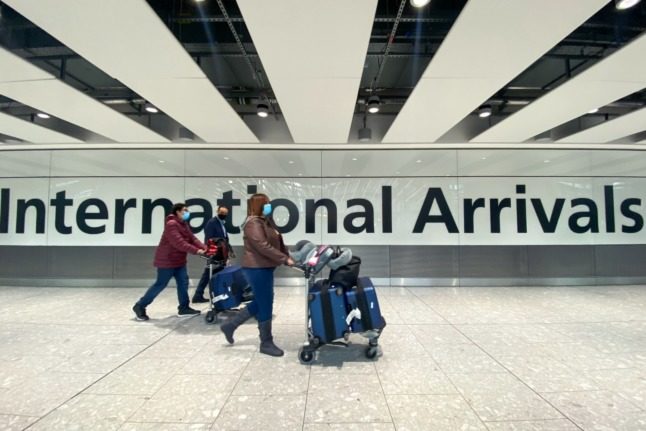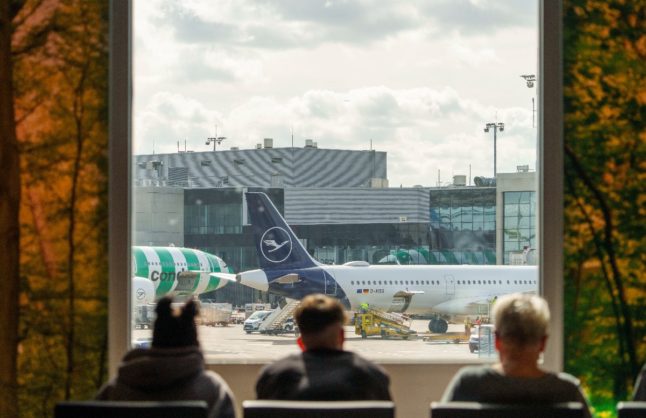Due to concerns over the emergence of the Omicron variant of Covid-19, the UK has changed its travel rules for arrivals from abroad.
What happens if you’re travelling from Germany to the UK?
On Saturday, December 4th, the British government announced yet more new testing rules for arrivals, demanding pre-departure tests for all arrivals from Tuesday December 7th onwards.
The requirement applies for those arriving in England, Scotland, Wales and Northern Ireland. People travelling to the UK have to take either an antigen test or PCR test in the two days before travel. Self-administered tests are not accepted.
Previously, on Tuesday, November 30th, the UK government had brought in other new restrictions affecting travel from abroad to the UK.
The existing rules remain in place around the Passenger Locator Form (more on that below), and if you are unvaccinated, you will need to quarantine for 10 days and take another test on the eighth day.
But a new requirement was introduced that applies to all vaccinated arrivals (including UK citizens and residents). They must do a PCR test for their Day 2 test (antigen tests are no longer accepted) and they must self-isolate until a negative result from the test arrives.
The self-isolation can be done at home or at the address of family/friends. The British government says people who are travelling to the UK for less than two days still have to book and pay for a test and then isolate until they receive a result – or until they leave if that comes first.
Only arrivals from red list countries including South Africa face hotel quarantine. You cannot leave self-isolation until the test result arrivals.
READ ALSO: What it was like navigating Covid travel rules to get home to the UK from Germany
You are permitted to travel by public transport to get from the airport/port/station to you quarantine address.
Most recently, vaccinated travellers did not have to quarantine when arriving while waiting for the results of their antigen test.
The changes have brought up lots of worries, especially ahead of the holidays.
Since summer, numerous readers of The Local have flagged up the slow and unreliable nature of many UK test providers – tests can only be booked from the list of ‘government approved’ suppliers from this list and NHS tests cannot be used for this purpose.
The Day 2 test must be ordered ahead of travel – without a booking reference you cannot complete the Passenger Locator Form which is required to board all transport to the UK.
The test can be taken “on or before day 2”, so you can take it as soon as you arrive in the UK.
You can find the Passenger Locator Form HERE. But beware of technical glitches with the form in recent weeks.
There are three options for tests:
- Home tests – these test packs are sent out to the address where you will be staying. You do the test at home and then post the sample to the lab, who email you the results when ready. There have been problems with test kits for some providers not arriving at the address given, while others take up to 10 days to email out the results – even for people who have paid extra for a quick-results service.
- Test centre tests – this involves booking in advance at a test centre near where you will be staying – people self-isolating are permitted to leave the address and go to a test centre. It can be hard to find a test centre near you, especially if you are outside London. The test centre then posts off the sample to the lab and you wait for the results by email, again this can take several days to arrive.
- Airport tests – it is compulsory to have booked the Day 2 test in advance, but if you want to avoid long waits for results, some airports now offer PCR tests with rapid results, in around three hours in some cases. However these are expensive and likely to get more expensive in the coming days as the UK government does not have any kind of price cap on testing. This option is again most likely to be found in large cities like London so if you live somewhere else they are much harder to find.
What else should I be thinking about?
The UK border officers will recognise proof of vaccination provided by the EU Covid Certificate given out in Germany.
For the UK, “fully vaccinated” means 14 days after your final dose of a EMA/FDA or Swiss approved vaccine (Pfizer, AstraZeneca, Moderna, Johnson & Johnson).
After a period of confusion, the UK government says that it will accept mixed doses administered in the EU (eg, one dose of AstraZeneca and one of Pfizer).
READ ALSO:
- UK says European travellers with mixed doses are classed as fully vaccinated
- German words you need to know – kreuzgeimpft
- Are you classed as fully vaccinated in the UK after having Covid and one jab?
However, people who have only had a single dose after previously recovering from Covid – which is standard practice in Germany – are not accepted as vaccinated by the UK.
You are only permitted to use a test provider from the list of government-approved firms – find that HERE and find our guide to the world of Day 2 tests HERE.
Anyone over the age of four needs to take a test on day two of arrival in the UK.
If you are staying less than two days in the UK, you still need to book the Day 2 test, but are allowed to leave quarantine in order to travel out of the country.
Click the following links to read more about travelling to England, Wales, Scotland and Northern Ireland.
And a word of warning – once you are in the UK, if you are pinged as a contact case, you may have to self-isolate for 10 days as the NHS Test and Trace programme refuses to recognise vaccinations administered outside the UK.
What about if you are travelling from the UK to Germany?
The travel rules for people coming from the UK into Germany remain unchanged.
Fully vaccinated people coming from the UK need to upload proof of their vaccination to the digital register. Unvaccinated people travelling from most non-EU countries like the UK can only enter Germany if they can prove they have an urgent need to do so.
There are some exceptions, such as for German citizens or residents and members of their immediate family. If you fall into one of these categories you are allowed to enter the country even if unvaccinated – but will need to complete a quarantine for 10 days because the UK is classed as a ‘high risk’ country.
This period can be ended earlier for those who can present a negative Covid test taken at least five days into the quarantine.
People travelling into Germany from anywhere in the world will need to show proof of vaccination, proof of recovery or a negative Covid test before being allowed entry. The airline carrier will usually check this, and spot checks around borders may be carried out on drivers.
Note that all travellers need to fill in the online form before travel from the UK to Germany.



 Please whitelist us to continue reading.
Please whitelist us to continue reading.
Member comments